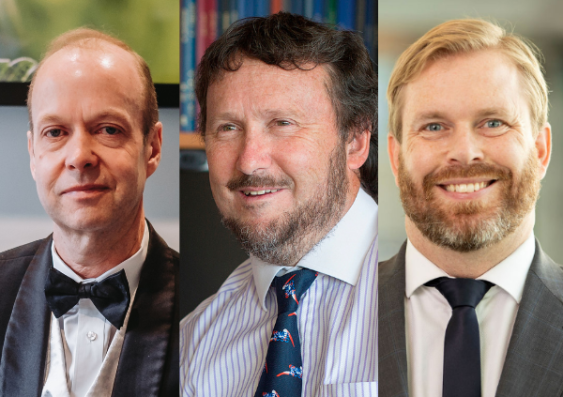UNSW researchers elected Fellows of the Australian Academy of Technological Sciences and Engineering
Stephen Foster, David Taubman and Daniel Lambert have been recognised among the nation’s most distinguished engineers and scientists.
Stephen Foster, David Taubman and Daniel Lambert have been recognised among the nation’s most distinguished engineers and scientists.

Louise Templeton
Corporate Communications
+61 (0)413 495 994
louise.templeton@unsw.edu.au
Three UNSW Sydney academics have been appointed Fellows of the Australian Academy of Technological Sciences and Engineering (ATSE) for their outstanding contributions to structural engineering, media compression technology and water management.
Dean of Engineering Professor Stephen Foster, Professor David Taubman and Adjunct Professor Daniel Lambert were among 33 new members announced by the ATSE last night. The Fellows are among Australia’s most distinguished engineers and scientists, elected by their peers for ground-breaking research in their fields.
ATSE President Dr Katherine Woodthorpe said the new Fellows are creating a better Australia through their work.
“As we face global challenges such as climate change, the digitisation of our economy and the massive challenge of building a diverse and skilled STEM workforce, technological innovation is the lynchpin for shaping our future. It’s looking bright thanks to the extraordinary contributions of our newest Fellows.
“It is a proud moment to be elected by your peers and acknowledged for your lifelong achievements. ATSE Fellows are truly exceptional at what they do, and Australia is all the better for them.”
Read more: World-class UNSW scientists recognised with ARC Industry Laureate Fellowships
Professor Stephen Foster has been elected for his role in advancing the quality and sustainability of concrete structures in Australia and around the world.
Prof. Foster is an internationally renowned authority in structural engineering whose research focuses on new materials. His contributions include advancements in high-strength reinforcing steels, low-carbon construction materials and ultra-high-performance concretes.
His research directly informs Australian Standards for concrete structures, including a world-first design standard for bridges incorporating steel fibre reinforced concrete. He also spearheaded globally important technical specifications for geopolymer concrete, which is less carbon-intensive than traditional concrete.
Prof. Foster provided expert advice in the wake of the high-profile Opal Towers, opens in a new window and Mascot Towers incidents, underscoring his standing as a trusted expert in his field. He is also President of the International Federation for Structural Concrete.
Professor David Taubman from the School of Electrical Engineering & Telecommunications has been recognised for his pioneering work in media compression technology and greatly advancing this field.
Prof. Taubman is an internationally respected inventor, discipline leader and entrepreneur whose research has had a transformative impact on industry practice in Australia and globally. He is the sole developer of an algorithm that is central to the JPEG 2000 suite of international standards for image and video compression, which is applied across geospatial, military and medical imaging, video broadcast and digital cinema.
The national archives of many countries are based on JPEG 2000 and countries across the globe use software developed by Prof. Taubman’s Kakadu Software, opens in a new window.
His deep theoretical and practical expertise, extensive industry collaborations, and service to international standards bodies, make him a leader in shaping our digital future.
Daniel Lambert, an adjunct professor at UNSW Engineering’s Water Research Centre, opens in a new window, has been admitted to the ATSE for his contributions and leadership in the water industry.
Prof. Lambert is an award-winning civil engineer and influential leader in the water industry, who is motivated by the life-changing impact of engineering solutions.
He has delivered water services to remote Aboriginal and Torres Strait Islander communities, advocated for recycled water, and found solutions for towns and cities across the Asia-Pacific.
Prof. Lambert is a go-to expert for water organisations both in Australia and internationally. His career has taken him to 25 countries and involved a diverse mix of policy, research, strategic planning and project delivery. He has overseen innovative research in integrated water management and climate change and helped pioneer two major water recycling projects during a drought in Melbourne.
He is Chief Executive Officer for WaterStart Australia and Chair of the Australian Water Partnership's Expert Review Panel.